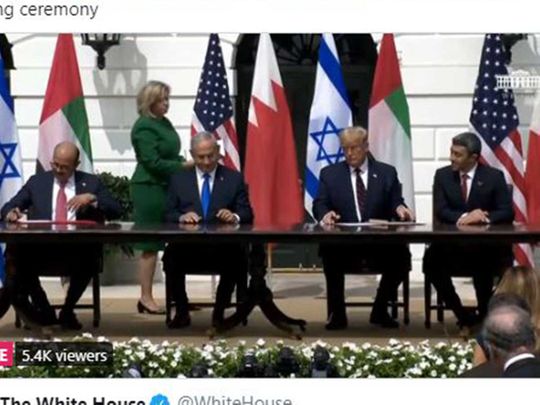Abu Dhabi: Ambassador Frank Wisner, former senior US diplomat, Monday expressed confidence that the US-UAE relationship “would weather the roiled waters of transition in Washington” and highlighted the deep and longstanding security and military relationship between the two countries.
Wisner, currently international affairs advisor at Squire Patton Boggs, discussed thePresident-elect Biden administration’s possible policy approaches to the UAE and wider Gulf region.
He highlighted some factors that could influence the US-UAE relationship such as the perception of Saudi Arabia in Congress, American policy towards Iran and the nuclear deal, and the US-UAE security relationship.
“The current US-UAE arms deal would pass through Congress at some juncture,” Wisner said.
He underscored the importance of the recently-signed Abraham Accords, which “enhanced the UAE’s reputation” and “added an element in the region’s balance of power”.
Wisner along with former Speaker of the US House John Boehner, former Congressman Joe Crowley, and trade policy expert Ludmilla Kasulke analyzed the domestic and foreign policy priorities of the incoming Biden Administration and Congress during a US-UAE Business Council webinar on Monday.
Former Speaker John Boehner, who is now a senior strategic advisor at Squire Patton Boggs, said that while President-elect Biden won the election, the Republicans fared relatively well in the House and Senate, noting Republicans picked up seats in the House and are slightly favored to keep control of the Senate ahead of runoff elections in Georgia. The speaker also stated that “the election is over in everybody’s mind — except Donald Trump’s” and that, “at some point, the President will get over this.”
He added: “The biggest change you will see in Washington will be the tone.”
Speaker Boehner also predicted that while President Biden’s relationship with Israel won’t be as close as Trump’s it will be closer than the relationship Obama had.
Joe Crowley, former Democratic Congressman from New York and Chair of the US House Democratic Caucus who now also serves as a Senior Policy Advisor at Squire Patton Boggs, said that while Biden was able to rebuild “the blue wall” by flipping states Trump had won in 2016 as well as winning Arizona and Georgia, the Democrats’ loss of seats in the House of Representatives “will temper the ambitions of the Biden team and Democrats writ large”.
Congressman Crowley noted the Republicans were also able to maintain control of several state legislatures that are key to determining congressional redistricting.
In regards to foreign policy, the former congressman voiced optimism over President-elect Biden’s upcoming nominations and said the Biden administration “will be the exact opposite of the Trump administration” in adopting an internationalist approach. He also underlined Biden’s deep experience in foreign policy during his tenure as a Senator and Vice President.
Ludmilla Kasulke, senior associate at Squire Patton Boggs, detailed the Biden administration’s possible trade agenda and associated challenges, particularly in regards to China and Asia writ large.
Kasulke noted she expects there will be “a return to multilateralism and diplomacy and an emphasis on rebuilding relations with key allies” and that there will be some changes to trade.
However, she cautioned these changes will not be immediate, as the Biden administration will be focused in other areas first, and “we are not expecting a complete 180 shift to the other direction”. She also underscored that both parties in the new congress are eager to continue to be “tough on China”. In relation to trade tariffs, Kasulke stated the Biden administration might eventually expand some steel and aluminium tariff exemptions for certain countries.
Following the panelists’ remarks, Danny Sebright, President of the US-UAE Business Council, moderated a question and answer session, during which the speakers elaborated on issues such as congressional dynamics and prospects for bi-partisanship, the proposed US $23 billion arms deal to the UAE, and competition with China.
In regards to Congressional dynamics, former Speaker Boehner cautioned that “people have a jaundiced view of how partisan thing are” in Congress, due in part to the media. He affirmed that both parties want to “show the American people they can get along.”
He thinks President-elect Biden’s cabinet picks will “by and large be approved.”
Moreover, he sees areas for cooperation with regards to Covid relief and an infrastructure bill.
He referenced President-elect Biden’s longstanding relationship with Senator McConnell and the President-elect’s ability to strike compromises during the Obama administration.
As for arms sales, Speaker Boehner asserted that one should “not underestimate the effectiveness” of UAE Ambassador Yousef Al Otaiba’s outreach to Democrats and Republicans alike.
He said the Ambassador’s close relationships in both the House and Senate “will pay big dividends.”He does not expect the arms sale to “be a problem,” saying one should “not read too much into” the actions of “a couple grandstanders on both sides of the aisle.”
The event, part of the Business Council’s “Back to Business” webinar series, was attended by over 250 senior executives from leading American and Emirati companies as well as US and UAE officials and thought leaders.

